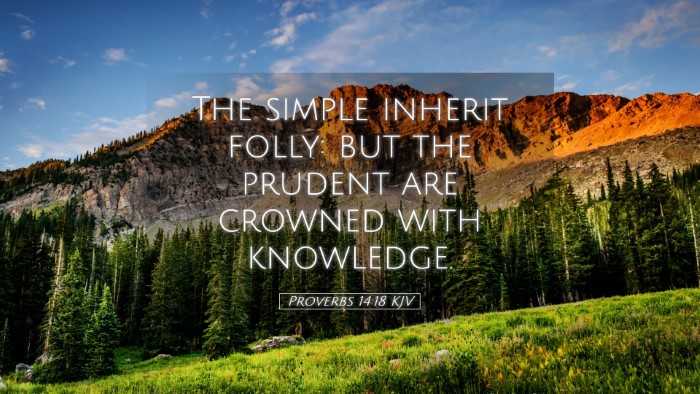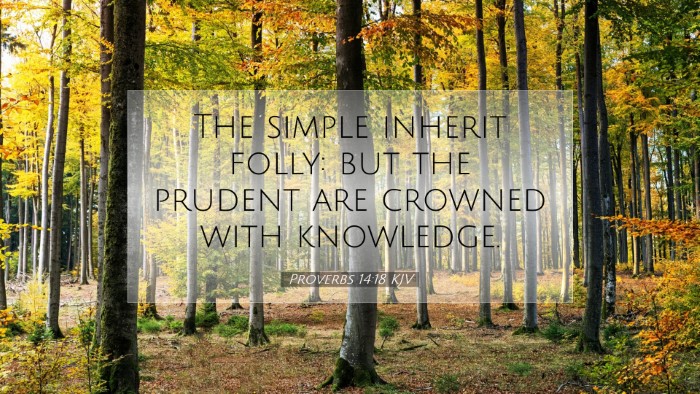Commentary on Proverbs 14:18
Proverbs 14:18 states, "The simple inherit folly: but the prudent are crowned with knowledge." This verse offers profound insight into the contrasting fates of the simple and the prudent. Public domain commentaries provide a rich tapestry of thoughts regarding the implications and meanings behind this verse.
Overview
The wisdom literature of the Bible often presents clear dichotomies between the wise and the foolish, the learned and the naive. In this context, "the simple" refers to those who lack discernment or wisdom. The term is used not in a derogatory sense but rather highlights an absence of understanding. This sets a stage for the contrasting figure of the “prudent”, who is characterized by wisdom and foresight.
Insights from Matthew Henry
Matthew Henry notes that simplicity is often accompanied by a lack of caution; the simple are prone to be led astray by the various whims of life. He writes, "The simple inherit folly," which highlights the natural consequence of leading an unguarded life. Henry goes on to state that it is not merely the act of being simple that is the issue, but rather the result of a lack of wisdom. He contrasts this with the "prudent," who not only seek knowledge but are also careful stewards of it.
Albert Barnes' Perspective
Albert Barnes emphasizes the twofold nature of the outcomes presented in this proverb. He argues, "The simple inherit folly," indicates that those who do not cultivate wisdom will ultimately reap the consequences of their ignorance. Barnes posits that folly, as a harvest, comes from a lack of foresight and a casual approach to life. On the other hand, the "prudent are crowned with knowledge," suggests that their diligence, thoughtfulness, and pursuit of understanding lead to a rich reward. He instructs readers to actively seek wisdom, reinforcing that knowledge is not merely received but taken hold of through effort.
Adam Clarke's Commentary
Adam Clarke provides a theological angle to this verse, suggesting that the "inheritance of folly" is a spiritual as well as an intellectual concept. Clarke challenges his readers to see folly as a universal inheritance amongst those who neglect divine wisdom. He quotes various cultures and texts to evidence that wisdom is prized in all spheres of life. To Clarke, the "prudent," embodying both fear of God and practical skill, becomes a model for the faithful believer, showing that an active pursuit of knowledge is both necessary and rewarding.
Thematic Reflections
The interplay between simplicity and prudence as discussed by these commentators raises critical themes for consideration:
- Consequences of Choices: The duality in this verse reminds us of the consequences that arise from our choices, urging us to seek wisdom actively.
- Active Pursuit of Knowledge: Knowledge must be pursued; it does not merely come to those who sit idly. There is a clear call to action for all believers.
- Folly as an Inheritance: Clarke’s insight points to the generational impact of folly, cautioning that ignorance can be socially transmitted.
- Value of Prudence: The wisdom literature extols prudence not just as a trait but as a form of virtuous living that involves forethought and self-control.
Practical Applications
As pastors, students, theologians, and Bible scholars engage with Proverbs 14:18, several practical applications emerge:
- Teaching Wisdom: Church leaders should focus on teaching the values of wisdom and discernment, helping their congregations to understand the importance of knowledge in their spiritual walks.
- Encouraging Critical Thinking: Encourage critical engagement with Scripture and the world, promoting a mindset that questions and seeks deeper understanding.
- Modeling Prudence: Models of prudent living should be showcased within faith communities, illustrating how investment in knowledge translates to fruitful living.
Conclusion
Proverbs 14:18 encapsulates a powerful message concerning the paths of simplicity and prudence. The consequences of each path illuminate the importance of an active pursuit of knowledge. As evidenced by the commentaries of Matthew Henry, Albert Barnes, and Adam Clarke, there is a rich heritage of understanding this proverb that offers direction and counsel for modern readers. Ultimately, this verse challenges all believers to reflect on their choices and encourages a diligent quest for wisdom, promising that those who choose the path of understanding will indeed be crowned with knowledge.


